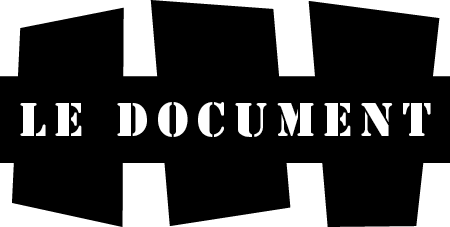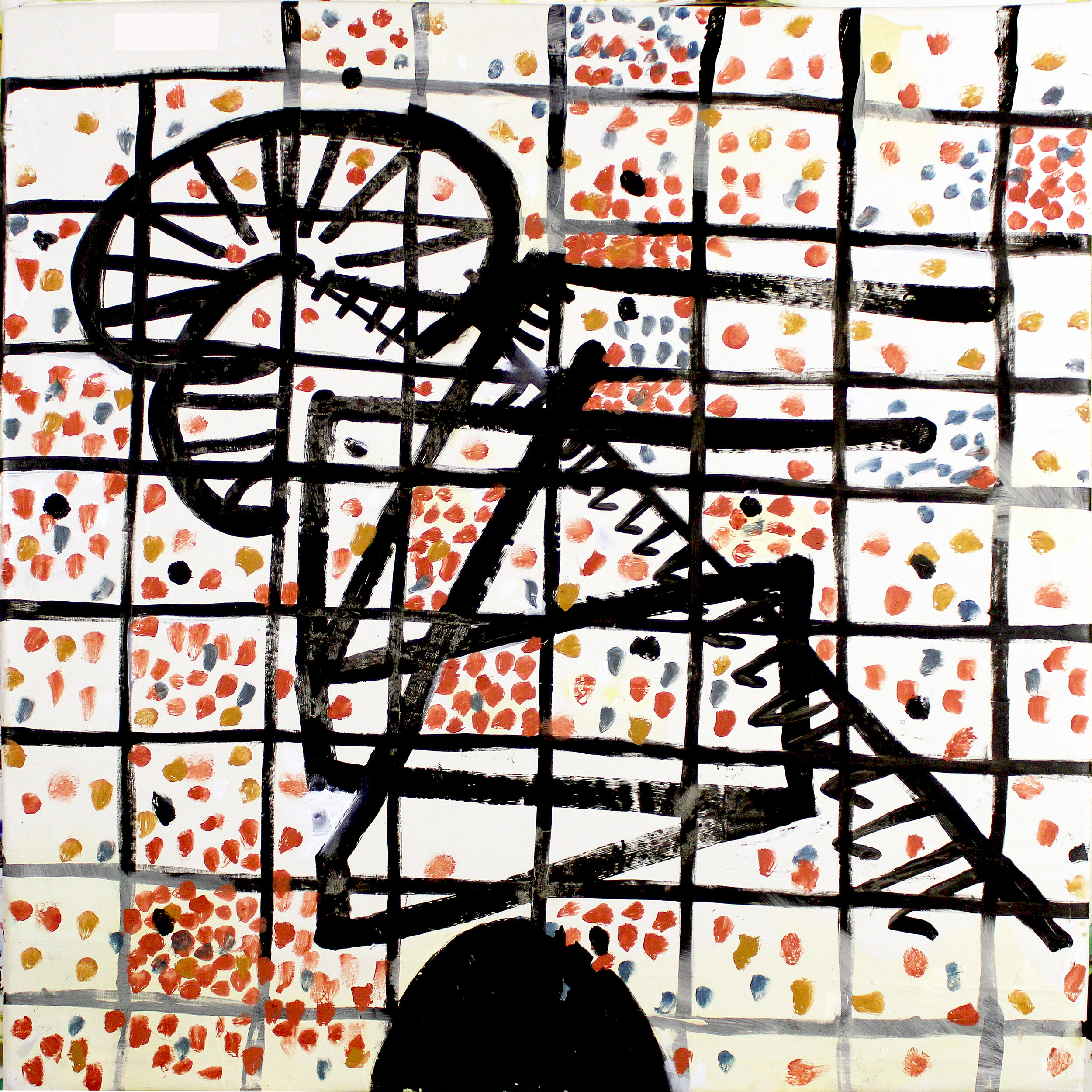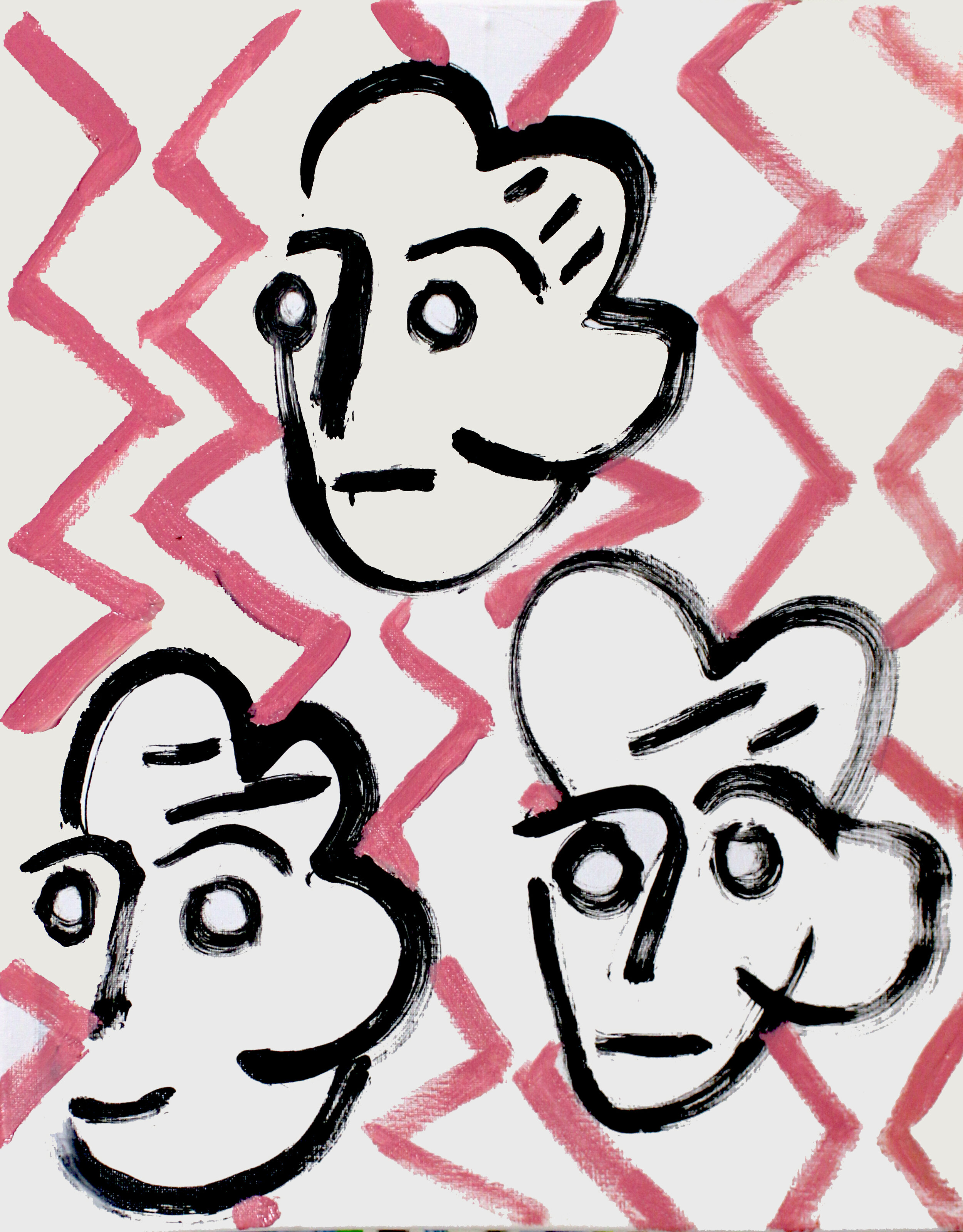Phil King
Above
The painter’s brain, 2018
Acrylic on cardboard
90 x 94 cm
Harry Pye: Are there any books about art or about artists that had a big impact on you, or that you think everyone should read?
Phil King: I think TJ Clark’s Farewell to an Idea had a really big impact ... more so because I can’t exactly remember reading it but when I look at it again it’s all very familiar and guiding.
Exhibition catalogues have been really important to me – I really value the whole going to an exhibition and getting fully into every aspect of the artist/artist’s in question. Often they are a paradigm shift in thinking generally and it feels vital being part of that. Some catalogues are of shows I didn’t see but still feel vital. The Late Cézanne catalogue or the Picasso and Braque show catalogues from MOMA had a very big impact. I guess that kind of feeds into the thinking of Farewell to an Idea which is about saying goodbye to modernism while remaining fascinated by it. Antonin Artaud’s writing have been very impactful and I’d be interested in what might be the result of them being more widely read!
Do you have artist friends who you get into heated debates with about painting? Or, when you get together with artist friends do you tend to talk about everything except painting?
Not so much getting together these days. Arguing has always been my thing and way of thinking things through – great heated discussions in pubs etc. I think I’m fascinated by the art of rhetoric in general and it led me to writing ... my argumentative creativity led to me being asked to write friends catalogue essays, Social media has been a kind of rocket fuel and I was a bit of menace on it for ages due to the great discussions that Matthew Collings hosted on his facebook page. I’ll argue about anything with anybody really if I feel that it can be creative in some way. Often people don’t know where I’m coming from which is understandable because I don’t know myself to be honest. I’d hate that to be limited to just being about painting!
What are your thoughts on Philip Guston’s Tate Modern show being postponed because of fears about his paintings that feature KKK imagery?
It feels like an attempt to put a lid on things. It would be more honest simply to put the show on now — with all the real upset and problems and difficulties — rather than this sense of ‘managing the problem’. There’s a sense of the museums trying to manage and contain real disruptive energy by making progressive gestures. Do we really think that the current bid to carry on running the USA as a white suprematist nation despite its changing racial demographics will be over in a mere four years? Or that current tensions will have resolved?! There was black president in charge when I lived in Oakland California and things just seemed to get worse and worse for black people there despite the appearance of progressive power. I think actual change comes from below not from getting museum wall labels right. I’ve seen a lot of Guston paintings – he’s been a ubiquitous presence and unavoidable influence for me since college in the 80s – so it’s odd coming at him anew ‘as a problem’ now. This does feel like his moment and his paintings look even more visionary than usual. Having said all that, and having signed the protest at the postponement petition, I do find the huffing and puffing going on around Guston by some painters a bit much. Maybe there is an absurd cult of self-importance that can build around Guston that does no one any favours least of all him and his work. It’s unlikely that he will ever be on US stamps like his Ab-Ex colleagues and to be honest I’m a bit confused by the idea that he should be! For me his real power is that of a deliberately minor painter working subversively in a grand mode – it isn’t the power of an official artist – either conservative or progressive. For me he is the Franz Kafka of modern painting – at his best a maker of vivid unanswerable problems working away in a make believe wasteland beyond the suburbs, far from central city. He's the DeChirico of the edge of town, of somewhere quite marginal. I think that now is actually a very good time for that threatening horizon to be presented anew because it is a problem that I don’t think is going away – and urbane Museum Directors bureaucratically trying to manage and defer their own contradictions won’t make it disappear.
Do you have a favourite painting in the National Gallery that you always pop into see when you’re near Trafalgar Square?
Van Gogh’s ‘chair.’ Kind of a miracle that it is there really. I sort of feel that it shouldn’t be so maybe I go and check to see if it is still there!
Can you name three painters alive and making work that you rate?
I can. Hard to restrict to three though. Albert Oehlen, Bridget Riley and Tom McGlynn.
What films have inspired your paintings?
Bambi and Dumbo and animation in general have affected my painting. Recently I’ve been finding that Spielberg’s “Saving Private Ryan” crept in when I painted a little silver and black painting - I think that when I paint small works I like to think of epic cinema scale and I think the attempt by Spielberg and his cinematographer to create an old immediate sensation like Robert Capra’s Omaha beach photos must have impacted at some point. So I called the painting ‘Saving Private Ryan’. It’s an ‘action’ painting simulation. I do find myself drawn to movie titles for my paintings sometimes. But I’m far from a movie buff. There is a lot of implied animation in my work and maybe I like to connect that to filmic thought. Often my work embodies a sense of conflict and contradiction so war film titles work. I do find war movies absurd to be honest. I’m actually just thinking of calling a newly finished painting ‘Battle of the Bulge’ … but maybe too much of a mock Anselm Kiefer notion now I think about it.
Who was your favourite tutor or which individual did you learn the most about painting from?
Peter Kinley at Bath Academy of Art. He really didn’t say much but it all seemed to matter a lot later in the studio. I wonder about his paintings most days.
And what was good about the way they taught you?
He had a very calm and open way of looking at things, he made looking itself feel important as a form of thinking I think. He say things like ‘you are drawing too much’ which I don’t think anybody else but a painter teaching in a art school would say to anyone. The sense of what isn’t there became more and more important. I’ve been been interested in how, without actually teaching anything concrete, he was able to become such a guide in what I do and see everyday. How his noticing and his own paintings combine to form my own vision, I’m not really sure how that works. He had a really grounded sense of curious authority, and a sense that art really mattered, that creative thought was a form of resistance and survival. I much later found he'd been a Jewish child refugee from Vienna and then, as a young British soldier, had been in Germany hunting Nazi's at very the end of the War. Demobed he'd studied at the Dusseldorf Art Academy at the same time as Joseph Beuys. I feel I learned that paintings exist in the mind as much as on the canvas but that you have to get all of it right on the canvas for that to work. That looking and reading are different activities and that painting really is a specific invention – he'd say just make paintings that work you don't have to justify them critically, that's someone else's job.
Is part of the reason you paint because you have a need to escape reality?
I think it comes more from a need to create reality, creating something means breaking with prior conditions, so there is a degree of escapism but one that actually makes things more real. It is all very objective. I initially found that my work took off from doodling, out of a resistance to classroom demands or stressful telephone conversations or being at work. I’d collect them and try and follow the logics involved - logics that felt fascinatingly unoriginal ... I’d steal others doodles. I’d feel odd that a sense of connection would develop out of such a disconnected basically escapist activity.
Do you see your paintings as being a form of diary?
Partly. It’s more as if they create horizons for a diary to take place in. Like with Peters’s comment about drawing there’s a sense that a dairy is a form of control and my paintings are not about control for me. They feel ahead of me rather than records of something, but then they look surprisingly old. I can’t really figure it out.
What time of day (or night) are you most likely to paint?
Whenever I feel like it.
What can you tell me about the most recent painting you did?
It’s a big one and I am waiting for the green to dry before I roll it up. It was originally based on a Pissarro village scene, then it naturally got more Cézannesque ... I wanted a giant impressionist feeling landscape. It got very surrealist though I think. It’s got a lot of texture work in it so it feels very up close and tangible, very George Braque to me anyway, but too big to be in that old bourgeois easel painting realm. I find it intimate and strange. Intimacy blown up. I can’t wait to do another one. I’m at the point of wondering what the ..... should I call this thing?
Do you believe that, in order to make art, the hand, the eye and the heart all need to be involved?
For me making art is everything, everything is involved. I’m always unsuccessfully trying to figure out what is consciously and what is unconsciously at work, but not in any controlling way. Everything is partial, I love the way habit and doing something wholly surprising somehow combine. I believe in desire as a working force I guess. In the work of longing.
2 Totem and Taboo Install shot Vienna 2019 Augury_NewJörg Gallery January 2019
Coal Miner's Daughter Acrylic and Oil on Polyester Canvas 90 x 90cm
Question time install shot Three works Gallery Scarborough march 2019
The Years. Oil on canvas 50x40cm 2020







